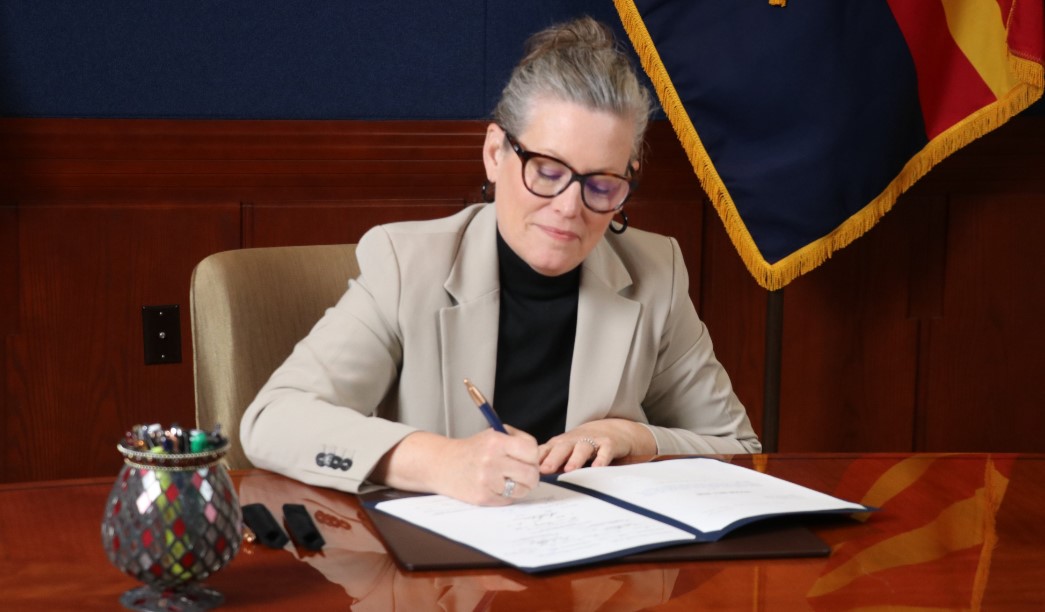
by Staff Reporter | May 2, 2024 | Education, News
By Staff Reporter |
Arizona Department of Education Superintendent Tom Horne advised K-12 schools to look to Arizona State University (ASU) and University of Arizona (UArizona) for how to respond to Gaza protesters.
In a press release issued on Monday following a long weekend of higher education protests against Israel in Arizona and nationwide, Horne praised ASU and UArizona leadership — specifically presidents Robert Robbins and Michael Crow — for their handling of the mass protests compared to other universities, which he characterized as antisemitic.
“Robert Robbins and Michael Crow deserve exceptional praise for standing up to antisemitism on their campuses. This stands in stark contrast to how many colleges, universities and ideological faculty members have kowtowed to disruptive pro-Hamas demonstrations,” said Horne. “It is also an excellent template for K-12 schools in Arizona to follow should any attempt be made by students to copy the type of protests that have shut down portions of college campuses and caused Jewish students to feel unsafe.”
Horne warned that history would repeat itself, should those in leadership not be proactive with handling protests. The superintendent cited several incidents of violence that broke out at other campuses nationwide, including rocks reportedly thrown at Jewish students at Columbia University and a pole with a Palestinian flag being stabbed into the eye of another Jewish student at Yale University.
“Our DNA is no different from the DNA of Germans in the 1930s, and Nazis started with young thugs attacking people on the street,” said Horne. “We need to be vigilant.”
Law enforcement for both campuses were swift to deter and move out protesters as they attempted to establish encampments.
Of the two institutions, UArizona had the calmer turnout in terms of protestors. At ASU, over 70 arrests were made, 15 of whom were students, after protesters set up an illegal encampment as part of their protest.
UArizona protesters also set up an encampment on Monday, but later dispersed. After those protesters left, officials barricaded the campus mall to prevent further encampments.
Law enforcement had to drive out the protesters and relied on assistance from fraternity members to assist in cleanup.
However, by Tuesday protesters returned to encamp again elsewhere on campus.
A majority of the Gaza protests were concentrated along the upper east coast. The following higher education institutions have experienced Gaza protests over the last few weeks:
- California: California State Polytechnic Institute, Stanford University, University of Southern California Los Angeles;
- Colorado: Auraria Campus;
- Connecticut: University of Connecticut, Yale University;
- D.C.: George Washington University;
- Delaware: University of Delaware;
- Florida: Florida State University;
- Georgia: Emory University, University of Georgia;
- Illinois: Northwestern University, University of Illinois Urbana-Champaign;
- Indiana: Indiana University Bloomington;
- Massachusetts: Emerson College, Harvard University, Massachusetts Institute of Technology, Northeastern University, Tufts University;
- Michigan: Michigan State University;
- Minnesota: University of Minnesota;
- Missouri: Washington University.
- North Carolina: University of North Carolina at Chapel Hill;
- New Jersey: Princeton University;
- New Mexico: University of New Mexico Albuquerque;
- New York: City College of New York, Columbia University, Cornell University, Fashion Institute of Technology, the New School, New York University, University of Rochester;
- Pennsylvania: Swarthmore College, University of Pennsylvania;
- Ohio: Ohio State University;
- Rhode Island: Brown University;
- South Carolina: University of South Carolina;
- Texas: Rice University, University of Texas at Austin;
AZ Free News is your #1 source for Arizona news and politics. You can send us news tips using this link.

by Staff Reporter | May 2, 2024 | News
By Staff Reporter |
A new poll from Emerson College and The Hill found that former President Donald Trump leads President Joe Biden in Arizona and six other key swing states.
The poll, released on Monday, reflected a consistency in swing state preferences since last November, according to the pollsters. Spencer Kimball, executive director of Emerson College Polling, said in a press release that the main differences concerned a diminishment in undecided voters and increase in support for Biden in Georgia and Nevada.
“The state of the presidential election in swing states has remained relatively consistent since Emerson and The Hill started tracking them last November,” said Kimball. “The share of undecided voters has reduced and Biden gained ground in Georgia and Nevada, narrowing the gap, while Trump has maintained a slight edge on Biden in Pennsylvania and Wisconsin.”
Trump leads Biden by four percent in Arizona (eight percent undecided), three percent in Georgia (nine percent undecided), one percent in Michigan and Nevada (11 percent undecided), five percent in North Carolina (10 percent undecided), and two percent in Pennsylvania and Wisconsin (eight percent undecided).
Last November, the pollsters found that Trump led Biden by two percent in Arizona among both registered and likely voters (16 percent and 11 percent undecided, respectively).
In this latest poll, Trump won over more independent voters than Biden in Arizona (48 percent compared to 38 percent), as well as Michigan (44 to 35 percent), Nevada (43 to 37 percent), Pennsylvania (49 to 33 percent), and North Carolina (41 to 38 percent). Georgia and Wisconsin independent voters favored Biden, at 42 to 38 percent and 44 to 41 percent, respectively.
Biden had a 51 percent disapproval rating, compared to 40 percent approval in Arizona. The other swing states had similar dismal disapproval ratings for the president: 52 percent disapproval in Georgia, Michigan, Nevada, and Wisconsin; 53 percent disapproval in North Carolina; and 51 percent disapproval in Pennsylvania.
Third party candidates reflected a bigger hurt than help for the incumbent president in most swing states, save for Arizona and Michigan, where Biden and Trump came up even for voter support.
The poll found that a plurality of voters in all swing states believed that the New York criminal trial against Trump was appropriate, and not a “witch hunt,” as the pollsters described.
13 percent of Arizona Republicans polled said they would be less likely to vote for Trump if he received a guilty verdict in the trial. Overall, a majority of Republican respondents said they would be more likely to support the former president should he be found guilty.
Independent voters said they would be 32 percent more likely to vote for Trump if he is found guilty, 43 percent said the ruling would have no impact, and 25 percent said they would be less likely to support him.
The poll also asked voters about their U.S. Senate candidates and sentiments of their governors.
In Arizona, 45 percent supported Democrat Ruben Gallego to replace outgoing Independent Senator Kyrsten Sinema, compared with 43 percent in support of Kari Lake. Gallego had a marginal gain of one percent compared to Lake’s three compared to the pollsters’ previous data from March.
Governor Katie Hobbs received a 42 percent disapproval rating, with 38 percent approving and 20 percent neutral. Hobbs was the only swing state governor on the poll that had a majority disapproval rating.
AZ Free News is your #1 source for Arizona news and politics. You can send us news tips using this link.

by Staff Reporter | May 1, 2024 | News
By Staff Reporter |
The state declined to retry the case of George Alan Kelly, 75, the rancher charged with the deadly shooting of an illegal immigrant on his property.
Kelly faced the possibility of a retrial after a deadlocked jury resulted in a declared mistrial last week. As he walked out of the Superior Court building, Kelly said that he had faith God would protect him from those upset over the prosecutors’ decision.
“The nightmare’s over,” said Kelly. “God’ll look after me, like he always has.”
A small group of protestors awaited Kelly’s exit from the courthouse on Monday. A few shouted after Kelly as he walked away. Some of the protestors’ signs likened the shooting to a hate crime.
That illegal immigrant, Gabriel Cuen-Buitimea, 48, was found dead by Kelly last January after the rancher had allegedly fired warning shots above Cuen-Buitimea and the other illegal immigrants he was trespassing with on the property.
Accounts of Cuen-Buitimea crew differ, depending on who gave testimony. Authorities characterized the group as illegal immigrants evading Border Patrol during a typical illegal crossing. Kelly claimed the group’s presence was marked by a gunshot, and that the men were camouflaged and carrying assault rifles, one of which Kelly said was pointed at him.
Cuen-Buitimea had been deported for illegal entry into the U.S. at least three times from 2011 to 2016. According to a friend’s account to The New York Times, Cuen-Buitimea lived with his two adult daughters in Nogales. The pair met with the Mexican Consulate in Nogales and prosecutors after the declared mistrial last week.
One of Cuen-Buitimea’s travel companions, Daniel Ramirez, later served as the key witness against Kelly; Ramirez was imprisoned for drug smuggling nearly 10 years ago, though he falsely told the court that he had no prior drug-related convictions.
Ramirez’s testimony was later scrutinized for alleged editorialization and coaching by prosecution.
Santa Cruz County Attorney George Silva released the following statement after their decision to not retry Kelly:
“Because of the unique circumstances and challenges surrounding State vs. George Alan Kelly, the Santa Cruz County Attorney’s Office has decided not to seek a retrial in this matter. However, our Office’s decision in this case should not be construed as a position on future cases of this type. Our office is mandated by statute to prosecute criminal acts, and we take that statutory mandate seriously. We will review all the facts of each case as they are presented to our office, and we will continue to prosecute all criminal acts that occur within our jurisdiction when a factual and legal basis exists for prosecution. Nothing follows.”
Following a similar statement from the county attorney’s office in court on Monday, Judge Thomas Fink said the court would schedule a hearing to determine whether to dismiss Kelly’s case with or without prejudice.
The Arizona Superior Court declared a mistrial last week after the jury was unable to reach a verdict. Seven wanted to find Kelly not guilty, but one wanted to sentence him on the charge of second-degree murder.
AZ Free News is your #1 source for Arizona news and politics. You can send us news tips using this link.

by Daniel Stefanski | May 1, 2024 | News
By Daniel Stefanski |
A legislative solution to crack down on organized retail theft crimes in Arizona was vetoed by the state’s Democrat governor.
Last week, Governor Katie Hobbs, vetoed SB 1414, which would have “require[d] a person who is convicted of a third or subsequent organized retail theft offense to be sentenced as a category two repetitive offender in certain circumstances” – according to the overview from the Arizona House of Representatives.
In her veto letter to Senate President Warren Petersen, Hobbs didn’t give a direct reason for why she took this action on this particular bill. Instead, she pointed to another proposal that she had signed into law, writing, “I have signed Sen. Gowan’s bill SB 1411 establishing an Organized Retail Theft Task Force in the Attorney General’s office that will be critical to adequately and appropriately combat this issue. Their first report is due July 1, 2025 and I look forward to reviewing their policy recommendations and working together to find balanced policies for this matter.”
The Arizona Senate Republicans Caucus’ “X” account respond to the Governor’s veto, saying, “Soft-on-crime Democrats with their relentless pursuit of treating criminals like victims will quickly change Arizona into the nightmare California has become. Law-abiding citizens should be outraged Katie Hobbs vetoed SB 1414, which would have established tougher punishments for retail thieves. Senate Republicans will continue to support policy that promotes safe communities and discourages criminals from victimizing our citizens and businesses.”
Maricopa County Attorney Rachel Mitchell also weighed in, stating, “By vetoing a prosecutors and retailers-supported bill for harsher penalties for retail thieves who want to sell what they steal, Katie Hobbs has shown us she is cut of the same weak on crime cloth as Manhattan DA Alvin Bragg, LA DA George Gascon, and Cook County State’s Atty Kim Foxx. Fortunately, she’s not in charge of a prosecution office. We will continue to hold thieves accountable.”
On the Arizona Legislature’s Request to Speak system, representatives from the Arizona Retailers Association, City of Phoenix, Arizona Food Marketing Alliance, Fraternal Order of Police, City of Glendale, City of Buckeye, City of Litchfield Park, Greater Phoenix Chamber of Commerce, City of Chandler, and City of Surprise signed in to support the legislation. A representative from the American Civil Liberties Union of Arizona opposed the bill.
The Arizona Senate had passed the bill in February with a bipartisan 18-10 vote (with two members not voting). Earlier this month, the Arizona House approved the legislation, after amending it, with a bipartisan 37-22 vote (with one member not voting). The Senate then concurred with the House’s changes, albeit with a partisan 16-14 split.
Daniel Stefanski is a reporter for AZ Free News. You can send him news tips using this link.

by Daniel Stefanski | May 1, 2024 | News
By Daniel Stefanski |
A bill to enhance efficiency in legislative appointments was signed into law by the Arizona governor.
Earlier this month, Governor Katie Hobbs signed SB 1278, which “prescribes requirements relating to the timeline for the county board of supervisors and precinct committeemen to fill a legislative vacancy, [and] requires the state party chairperson to fill a legislative vacancy if the county board of supervisors fails to fill the vacancy.”
According to the fact sheet for the legislation, SB 1278 “prescribes a timeframe for the county board of supervisors to fill a vacant legislative office by requiring the county board of supervisors to make the appointment within: a) 10 calendar days of receiving the names of the nominees if the Legislature is in session…; or b) 21 calendar days of receiving the names of the nominees if the Legislature is not in session.”
Senator J.D. Mesnard, the sponsor of the bill, issued a statement to mark the success of his proposal. He said, “We’ve had a number of instances this legislative session and last where state lawmakers were either removed or resigned from office for one reason or another. When this happens, business at the Capitol can be brought to a standstill until a replacement has been appointed. The process to appoint a new lawmaker can sometimes drag out and county board of supervisors have taken entirely too long to fill a vacancy in many situations.”
Mesnard added, “My bill, SB 1278, was just signed into law this week and requires government to be more efficient when filling these roles by establishing in statute reasonable timelines and protocols to designate a replacement in a prompt fashion to prevent a lengthy disruption to the legislative process. This new law will ensure the legislature is working as proficiently as possible for the people of Arizona when these situations arise.”
In February, Mesnard’s proposal passed the Arizona Senate with a 27-0 vote (with three members not voting). It was amended and approved in the Arizona House in early April with a 59-0 vote (with one vacant seat). The Senate then concurred with the House’s changes with a 28-0 vote (with two members not voting) before sending it to the Governor’s Office for Hobbs’ decision.
SB 1278 will go into effect 90 days after the end of the 2024 Arizona Legislative Session.
Daniel Stefanski is a reporter for AZ Free News. You can send him news tips using this link.

by Daniel Stefanski | Apr 30, 2024 | News
By Daniel Stefanski |
Arizona homeowners were unable to acquire enhanced protections for their properties thanks to a veto from the state’s Democrat governor.
Earlier this week, Governor Katie Hobbs vetoed SB 1129, which would have “allow[ed] a property owner or the property owner’s authorized agent to request, from law enforcement, the immediate removal of a person who is unlawfully occupying a residential dwelling, outline[d] conditions that determine if a person is unlawfully occupying a residential dwelling, [and] deem[ed] that a person who fails or refuses to surrender possession of the property as directed by a law enforcement offer is committing trespass” – according to the purpose from the Arizona Senate.
In her veto letter to Senate President Warren Petersen, Hobbs explained that the proposed “fails to leverage existing legal mechanisms, respect the due process rights of lawful tenants, and minimize unintended consequences, such as for victims of domestic violence.”
Senator Wendy Rogers, the bill’s sponsor, reacted to the governor’s decision on her legislation, writing, “Criminals are scheming to take over homes that aren’t theirs, posing a threat to the safety of homeowners and infringing on their private property rights. Although we have trespassing laws, it’s often difficult to prove a person is unlawfully occupying a home and can result in a lengthy legal battle. Homeowners testified in committee hearings about their property being severely damaged, the subsequent astronomical costs from these criminals, and consequently, they felt incredibly violated. We should not further victimize homeowners with a time-consuming, cumbersome, and costly removal process.”
Rogers also addressed the governor’s reasoning in her letter, saying, “In her veto letter, Katie Hobbs claims this bill fails to protect the rights of lawful tenants and minimize unintended consequences for victims of domestic violence. Did she read the bill? It addresses illegal occupants, not lawful tenants. That’s precisely the point. This bill has absolutely NOTHING to do with landlord-tenant law and has exemptions for family members and anyone with an agreement to cohabitate.”
The governor’s veto attracted the attention of one of her colleagues from across the country and the political aisle – Florida Governor Ron DeSantis, who said, “The Governor of Arizona just vetoed a bill that we signed here in Florida so that these squatters could be ejected. What kind of a message does that send? You’re saying you can squat in somebody’s house and basically they got to go through a six month process.” DeSantis added, “We’re putting an end to the squatters scam in Florida. While other states are siding with the squatters, we are protecting property owners and punishing criminals looking to game the system.”
Senator Justine Wadsack, a cosponsor of the bill, also weighed in on the action from the Ninth Floor of the Arizona State Executive Tower. She said, “”As a Realtor, I’ve personally encountered a squatter occupying a home I was showing to a client. It was a terrifying threat to my safety, the safety of my clients, as well as to the homeowners. When I called the police, I was told there’s not much they could do. Nobody should ever be allowed to live in and occupy another person’s home without their permission, yet I continue to have constituents reach out to me with these types of stories. I’m proud of the swift and unified response Republican lawmakers made to fight this issue, it’s a shame Governor Katie Hobbs has vetoed yet another piece of commonsense bipartisan legislation.”
Senators Farnsworth, Kavanagh, Kern, Shope, and Representative Gillette – all Republicans – were cosponsors of the legislation.
Daniel Stefanski is a reporter for AZ Free News. You can send him news tips using this link.






